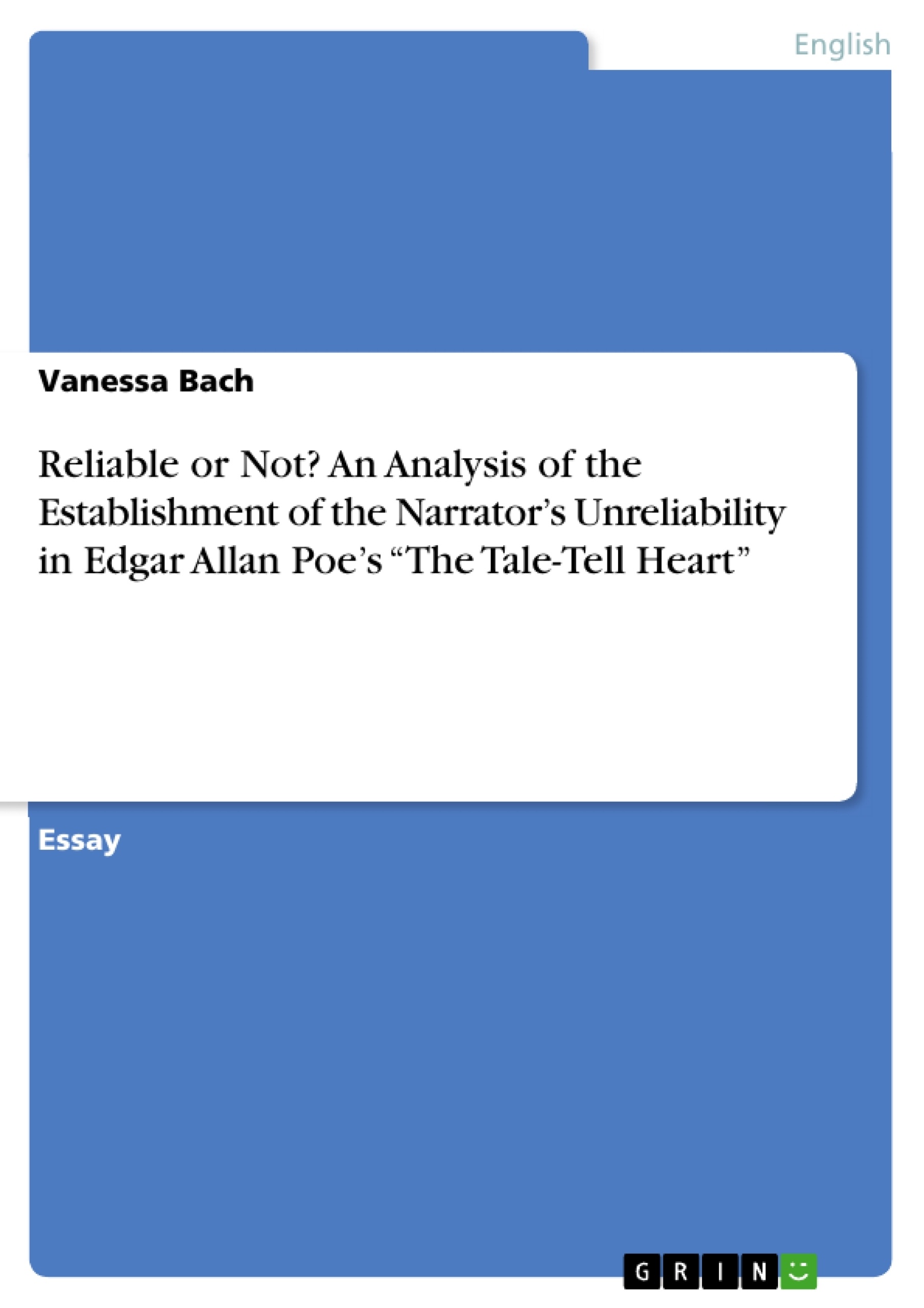The aim of this paper is to analyze the establishment of the narrator’s unreliability in Edgar Allan Poe's "The Tell-Tale Heart". Therefore, the paper will first take a look on how the narrator presents his state of mind to the reader by pointing his arguments for his sanity out. Then, indications for the narrator’s unreliability are worked out. Finally, the conflict between realities is briefly viewed and a conclusion made.
Table of Contents
- Introduction
- Narrator reliable or not?
- The narrator's presentation of his state of mind
- Indications for the narrator's unreliability
- Conflict between realities
- Conclusion
Objectives and Key Themes
The aim of this paper is to analyze how the unreliability of the narrator in Edgar Allan Poe's "The Tell-Tale Heart" is established. The paper examines the narrator's presentation of his own sanity, explores indicators of his unreliability, and briefly considers the conflict between his perceived reality and objective reality.
- Narrator Reliability and Unreliability
- The Presentation of Sanity
- Indicators of Mental Instability
- Distorted Perception of Reality
- The Role of Language and Style
Chapter Summaries
Introduction: This introductory section sets the stage for the analysis by quoting the narrator's initial claim of nervousness but not madness, immediately establishing the central question of the narrator's reliability. It concisely states the paper's objective: to analyze how the narrator's unreliability is established. The introduction outlines the structure of the analysis, promising to examine the narrator's presentation of his sanity, indicators of unreliability, and the conflict between realities. The use of Poe's opening quote immediately engages the reader and highlights the inherent ambiguity at the heart of the story.
Narrator reliable or not?: This section delves into a multifaceted exploration of the narrator's reliability. It begins by analyzing how the narrator attempts to convince the reader of his sanity, pointing to his meticulous planning and calm demeanor during the murder as evidence of his rationality. However, this section moves to counter these claims by presenting various indications of the narrator's unreliability. The analysis of his language, marked by hyperbole, epanalepsis, and exclamations, reveals a stylistic instability that contrasts sharply with his claimed composure. The section also examines the narrator's heightened sensory perception, suggesting delusional acoustic hallucinations such as the increasingly loud heartbeat, as well as the obsessive focus on the old man's eye as a significant factor influencing the murder. The narrative arc within this section effectively builds a case for the narrator's unreliability by juxtaposing his self-portrayal with compelling evidence to the contrary.
Keywords
Narrator reliability, unreliable narration, Edgar Allan Poe, The Tell-Tale Heart, mental instability, psychological disorder, hallucination, perception, language style, hyperbole, unreliable narrator, sanity, madness.
Edgar Allan Poe's "The Tell-Tale Heart": A Comprehensive Analysis - FAQ
What is the purpose of this paper?
This paper analyzes how the unreliability of the narrator in Edgar Allan Poe's "The Tell-Tale Heart" is established. It examines the narrator's presentation of his sanity, explores indicators of his unreliability, and considers the conflict between his perceived reality and objective reality.
What are the key themes explored in the analysis?
Key themes include narrator reliability and unreliability, the presentation of sanity, indicators of mental instability, distorted perception of reality, and the role of language and style in conveying the narrator's mental state.
What is the structure of the analysis?
The analysis is structured into an introduction, a main section focusing on the narrator's reliability (or lack thereof), and a conclusion. The main section explores the narrator's attempts to portray himself as sane, contrasting this with evidence suggesting his unreliability. This evidence includes analysis of his language, sensory perceptions, and actions.
How does the analysis establish the narrator's unreliability?
The analysis establishes the narrator's unreliability by examining several aspects: his attempts to convince the reader of his sanity despite contradictory evidence, his use of hyperbole and other stylistic devices revealing mental instability, his heightened sensory perception leading to potential hallucinations (the increasingly loud heartbeat), and his obsessive focus on the old man's eye.
What specific literary devices are analyzed to demonstrate the narrator's unreliability?
The analysis examines the narrator's use of hyperbole, epanalepsis (repetition of the same word or phrase at the beginning and end of a clause), and exclamations. These stylistic choices reveal a degree of instability that contrasts with the narrator's claimed composure and rationality.
What role does the narrator's perception of reality play in the analysis?
The analysis highlights the conflict between the narrator's perceived reality (his belief in his sanity and rational actions) and objective reality (the evidence suggesting his mental instability and irrational actions). This conflict is a crucial element in establishing the narrator's unreliability.
What are the key takeaways from the analysis?
The analysis demonstrates how Poe crafts an unreliable narrator, using stylistic choices and narrative techniques to create ambiguity and raise questions about the narrator's mental state. The reader is left to interpret the events and the narrator's claims, rather than accepting them at face value.
What keywords are associated with this analysis?
Keywords include: Narrator reliability, unreliable narration, Edgar Allan Poe, The Tell-Tale Heart, mental instability, psychological disorder, hallucination, perception, language style, hyperbole, unreliable narrator, sanity, madness.
- Quote paper
- Vanessa Bach (Author), 2016, Reliable or Not? An Analysis of the Establishment of the Narrator’s Unreliability in Edgar Allan Poe’s “The Tale-Tell Heart”, Munich, GRIN Verlag, https://www.grin.com/document/463124



